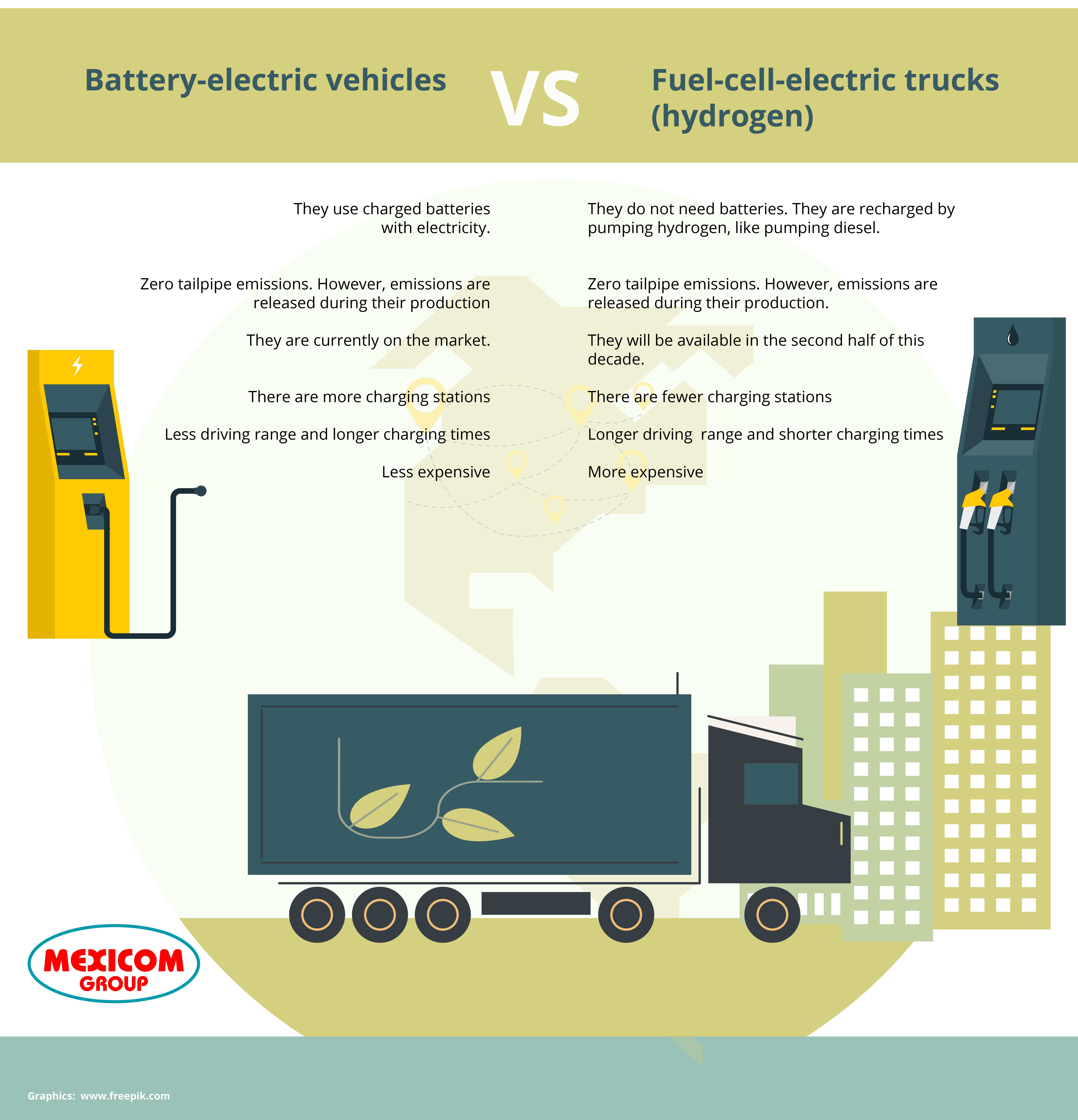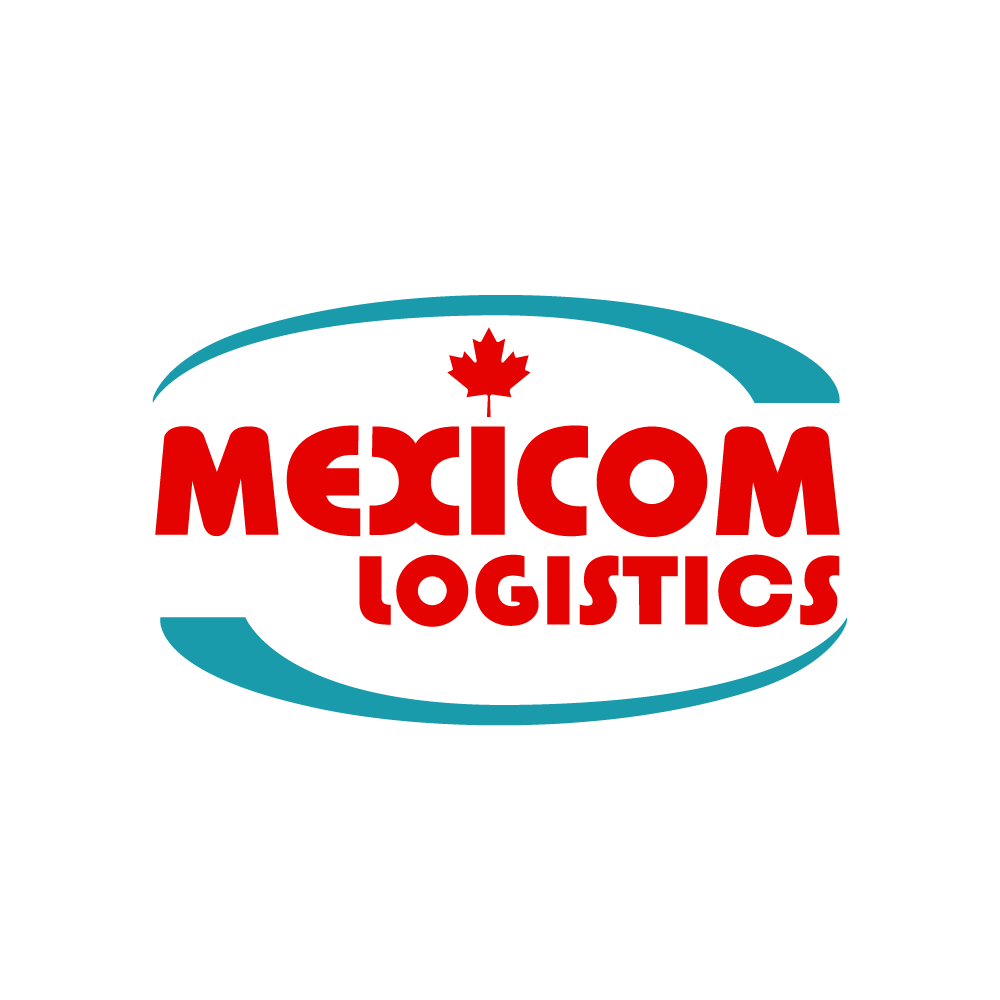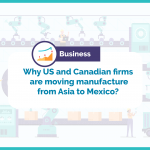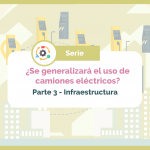[Infographic ] Series – Will heavy trucks go electric in North America? – Part 2. Hydrogen vs Electricity

What is electromobility?
Electromobility refers to vehicles that are fully or partly powered by electricity, have a means of storing energy on board and are usually supplied via the grid.
The main type of vehicle with an electric driveline is the BEV (battery electric vehicle), but there are also electric vehicles fuelled by hydrogen called fuel cell electric vehicles (FCEVs). Electromobility also includes the charging infrastructure and support services for range and route planning and other functions. – Volvo
The main goal of the electrification of mass market transportation is to reduce from diesel to a more cost-effective fuel that is better for the environment. But what is better, battery-electric vehicles or fuel-cell-electric (hydrogen) trucks?
Battery-electric vehicles vs fuel-cell-electric trucks (hydrogen)
Fast facts on Hydrogen Trucks:
- George Bush and Arnold Schwarzeneggar spoke of the “Hydrogen Highway”.
- Hydrogen Trucks convert hydrogen and ambient oxygen into electricity will emit only water vapor
- Nikola, Hyundai, and Toyota Trucks are examples of companies utilizing Hydrogen
- Toyota already has sold 1,500 PPT units
- Hyundai is investing $1.3 Billion into hydrogen infrastructure
- Volvo/Mercedes-Benz have developed a hydrogen fuel concept truck that would allow for 621 miles on a single tank. Trials start in 2023.
- Nikola/General Motors hope to deliver trucks within the next two years and eliminate the need to produce new diesel trucks by 2027.
Fast Facts on Electric Trucks
- Test of electric trucks is further along than Hydrogen trucks.
- Per Tim Denoyer of ACT research, there is an estimated 4,000 to 5,000 electric trucks utilized in North America while there are far fewer hydrogen trucks (low hundreds)
- Consumers are testing several Class 8 trucks made by Daimler in CA currently
Comparison, Electricity vs hydrogen:
Power
How do you power a Hydrogen truck?
Hydrogen-powered trucks don’t need charging like an electric trucks. They can be refueled with hydrogen gas, pumped in the same way you would a conventional diesel truck. It takes 3-5 minutes to fill a full tank. An electric vehicle using fuel cell technology (FCEV) is fuelled with hydrogen which is converted to electricity while the vehicle is being driven.
How do you charge an electric truck?
Recharging
There are fewer hydrogen refueling stations available than electric charging stations.
Range
Hydrogen fuel cell vehicles offer greater ranges and faster refueling times too.
Cost of Ownership
Hydrogen vehicles are more expensive than electric vehicles.
Conclusion:
According to the U.S. Department of Energy, “electric trucks are expected to become cost-competitive for smaller trucks before 2030 while heavy trucks with less than 500-miles of range are projected to be cost-competitive by 2035. Due to advancements for fuel cells and clean hydrogen production, hydrogen fuel cell electric vehicles are expected to become cost-competitive for long-haul heavy-duty trucks with greater than 500-mile range by 2035.”
Sources:
https://www.whitehouse.gov/briefing-room/statements-releases/2022/03/07/fact-sheet-vice-president-harris-announces-actions-to-accelerate-clean-transit-buses-school-buses-and-trucks/
https://www.energy.gov/articles/doe-projects-zero-emissions-medium-and-heavy-duty-electric-trucks-will-be-cheaper-diesel
https://www.volvogroup.com/en/news-and-media/news/2022/jan/news-4158927.html
https://www.greencarcongress.com/2022/05/20220519-ecascadia.html
https://www.volvogroup.com/en/news-and-media/news/2022/jan/news-4158927.html
https://freightliner.com/trucks/ecascadia/
https://nikolamotor.com/tre-bev
https://www.cnbc.com/2022/03/23/nikola-begins-production-of-battery-electric-tre-semitruck.html
https://www.transportdive.com/news/Trucking-battery-electric-versus-fuel-cell-hydrogen/610283/
https://afdc.energy.gov/files/u/publication/electric_vehicle_charging_infrastructure_trends_fourth_quarter_2021.pdf
https://ohioinsuranceagents.com/wp-content/uploads/2022/04/REVISED-UNDERSTANDING-TRUCKING-COVERAGES-003.pdf
usatoday.com


![[Infographic ] Series – Will heavy trucks go electric in North America? – Part 2. Hydrogen vs Electricity [Infographic ] Series – Will heavy trucks go electric in North America? – Part 2. Hydrogen vs Electricity](https://mexicomlogistics.com/wp-content/uploads/bfi_thumb/dummy-transparent-rg1talopm5vqzufhfknfekzf15cxqqaozt80fj4ud4.png)







This article has good information. I searched many times on the internet but
could not find it. Thanks for the good article and I hope you will write more.
I’m satisfied that you just shared this helpful information with us.